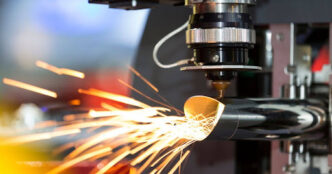In the world of manufacturing, two technologies stand out for their ability to transform raw materials into precision-engineered components: metal welding and CNC services. These processes are the backbone of industries ranging from aerospace and automotive to construction and electronics. Together, they enable the creation of durable, high-quality products that meet the demands of today’s fast-paced world. In this article, we’ll explore the fundamentals of metal welding and CNC services, their applications, benefits, and how they work together to drive innovation in manufacturing.
What is Metal Welding?
Metal welding is a fabrication process that joins two or more metal pieces by melting and fusing them together. This is typically achieved by applying heat, pressure, or a combination of both. Welding is essential for creating strong, durable joints that can withstand stress, pressure, and environmental factors.
Common Types of Metal Welding
- Arc Welding:
- Uses an electric arc to generate heat and melt the metals.
- Includes techniques like MIG (Metal Inert Gas) and TIG (Tungsten Inert Gas) welding.
- Gas Welding:
- Uses a flame produced by burning a mixture of oxygen and acetylene.
- Ideal for repairing and joining thin metal sheets.
- Resistance Welding:
- Applies pressure and electric current to join metals.
- Commonly used in the automotive industry for spot welding.
- Laser Welding:
- Uses a highly focused laser beam to melt and join metals.
- Offers precision and minimal heat distortion.
- Friction Welding:
- Joins metals by generating heat through mechanical friction.
- Suitable for welding dissimilar metals.
Applications of Metal Welding
Metal welding is used in a wide range of industries, including:
- Construction:
- Building bridges, skyscrapers, and pipelines.
- Automotive:
- Manufacturing car frames, exhaust systems, and engine components.
- Aerospace:
- Joining aircraft structures and engine parts.
- Shipbuilding:
- Constructing hulls, decks, and other marine components.
- Consumer Goods:
- Producing appliances, furniture, and electronics.
What Are CNC Services?
CNC (Computer Numerical Control) services involve the use of computerized machines to perform precise machining operations. These machines follow digital design files to cut, shape, and finish materials with high accuracy. CNC services are widely used for manufacturing complex parts and components.
Types of CNC Services
- CNC Milling:
- Uses rotating cutting tools to remove material from a workpiece.
- Ideal for creating complex geometries and features.
- CNC Turning:
- Rotates the workpiece while a stationary cutting tool shapes it.
- Commonly used for producing cylindrical parts.
- CNC Drilling:
- Creates holes in a workpiece with high precision.
- CNC Grinding:
- Uses abrasive wheels to achieve fine finishes and tight tolerances.
- CNC Laser Cutting:
- Uses a laser beam to cut through materials with precision.
Applications of CNC Services
CNC services are essential in industries that require precision and repeatability, such as:
- Aerospace:
- Manufacturing turbine blades, engine components, and structural parts.
- Medical:
- Producing surgical instruments, implants, and prosthetics.
- Automotive:
- Creating engine blocks, transmission components, and custom parts.
- Electronics:
- Machining enclosures, heat sinks, and connectors.
- Prototyping:
- Developing prototypes for testing and validation.
The Synergy Between Metal Welding and CNC Services
Metal welding and CNC services often work hand-in-hand to deliver high-quality products. Here’s how they complement each other:
- Precision and Strength:
- CNC services create precise components, while welding ensures strong, durable joints.
- Complex Assemblies:
- CNC machining produces intricate parts, which are then assembled using welding techniques.
- Material Versatility:
- Both processes can handle a wide range of materials, including metals, plastics, and composites.
- Efficiency:
- Combining CNC services with welding streamlines the manufacturing process, reducing production time and costs.
Benefits of Metal Welding and CNC Services
- High Precision:
- CNC services offer unmatched accuracy, while welding ensures strong, reliable joints.
- Versatility:
- Both processes can be used with a variety of materials and applications.
- Cost-Effectiveness:
- Automated CNC services and efficient welding techniques reduce labor and material costs.
- Scalability:
- Suitable for both small-scale prototyping and large-scale production.
- Durability:
- Welded joints and CNC-machined parts are built to last, even under demanding conditions.
Choosing the Right Metal Welding and CNC Services
When selecting a service provider, consider the following factors:
- Experience and Expertise:
- Look for a provider with a proven track record in your industry.
- Advanced Equipment:
- Ensure the provider uses state-of-the-art welding and CNC machines.
- Quality Assurance:
- Verify that the provider has robust quality control processes in place.
- Customer Support:
- Choose a provider that offers excellent communication and support.
- Turnaround Time:
- Opt for a service that can deliver high-quality results within your timeline.
Future Trends in Metal Welding and CNC Services
The future of metal welding and CNC services is shaped by technological advancements and industry demands:
- Automation and Robotics:
- Increased use of robots for welding and CNC machining to improve efficiency and precision.
- Additive Manufacturing:
- Combining CNC services with 3D printing for hybrid manufacturing solutions.
- AI and Machine Learning:
- AI-driven optimization of welding and machining processes for improved performance.
- Sustainability:
- Development of eco-friendly welding techniques and CNC machining practices.
Conclusion
Metal welding and CNC services are indispensable tools in modern manufacturing, offering precision, strength, and versatility. Whether you’re building a skyscraper, manufacturing a car, or prototyping a new product, these processes ensure that your components are durable, reliable, and built to the highest standards.
By partnering with a trusted provider of metal welding and CNC services, you can unlock new possibilities for your projects and stay ahead in today’s competitive market.














